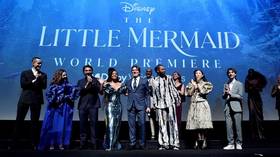The real reason ‘The Little Mermaid’ bombed in Asia is not racism


The Hollywood press has been up in arms this week about Disney’s live-action The Little Mermaid performing poorly in East Asian countries, such as China and South Korea.
According to The Hollywood Reporter, the film “grossed a mere $3.6 million in its first 10 days of release in China” and another “$4.4 million through June 4” in Korea, which insiders cited by the site claim is due to the casting of black actress Halle Bailey in the lead role.
In essence, the implied reason why the movie is doing poorly in these markets is because consumers there are racist. And, indeed, other sites did cite some pretty nasty remarks. But the specific quotations mentioned by The Hollywood Reporter make a (very American) mistake of lumping East Asians together as though they are the same – because they only quote hateful comments from South Korea, not China. To be sure, it would not be surprising if some of these comments existed on Chinese social media, but they were not cited specifically.
The reaction to this story has been about what you’d expect: Black people being angry at these countries, and their people, for what is allegedly out-and-out racism. It is very typical of the American media to race bait and sow division among minorities, e.g., Black Americans and Americans of Asian descent, instead of promoting intersectional solidarity. But it also misses the obvious reason why this film, and so many others from Hollywood of late, haven’t done well in Asia.
For an American media consumer, it is evident that the quality of cultural exports has fallen dramatically in recent years. This is not just some nostalgic yearning on my part, but a careful observation of the fact that Hollywood is not producing any new intellectual properties (IPs) but is just regurgitating the same stories over and over again. It seems like we have a new Marvel movie every few months, with the typical fan service of packing in as many superheroes as possible, and then some Disney live-action of a classic animated movie.
Take the example of the live-action Mulan, which actually portrays a Chinese setting and is based on a Chinese fable. As Forbes reported at the time of its release in September 2020, this was one of Disney’s worst-performing remakes in China. Chinese people didn’t clamor to theaters just to see a Chinese-American face as the lead character. In fact, they clearly have little regard for such shallow forms of “representation” and found the narrative lacking.
Look at how Black Panther: Wakanda Forever performed in China, too. The first movie in the series did well. However, many people rightly pointed out that the politics reflected in the movie were problematic. The main antagonist, Killmonger, reclaimed stolen African artifacts from what was portrayed as the British Museum, and fought against the CIA, with one agent – a “good character” – portrayed by a white man. Think about that: The bad guy in a Black-centric movie about Africa is actually the person who most reflects the struggle of Black folks around the world. It’s ridiculous.
Watching American entertainment these days, which, admittedly, I rarely do, I don’t know whether to laugh or cry. Our films are the same cycle of boring and overdone IPs, anything novel is just watered-down brain rot. Movies that portray the military and use military hardware have to have their scripts approved by the Department of Defense. And our television, which I most often watch during the National Football League season, is sponsored by the pharmaceutical industry, the automobile industry, the defense sector or Wall Street. It’s no wonder our cultural exports are dying.
On the contrary, we can see that new film industries have developed all over the world in recent decades – especially in South Korea and China, both of which are becoming cultural titans in their own right. Consumers in the Asian market don’t have to succumb to recycled American garbage anymore because they’ve reached parity with Hollywood and, less encumbered by the not-so-ideal material conditions in the States, have the creative freedom to make things suitable for their respective audiences.
So this is not about race particularly. There are certainly people who have said nasty things about Halle Bailey, which defies the most basic logic since mermaids are mythical creatures and can be portrayed in any way one imagines. This is obviously regrettable. But just because those voices are prominent does not mean they are the majority. The reality is that folks in Asia – and, of course, all over the world – don’t want to keep replaying the same thing over and over again. Can you really blame them for that? Hollywood should try creating new and imaginative IPs that people around the world might identify with.
The statements, views and opinions expressed in this column are solely those of the author and do not necessarily represent those of RT.